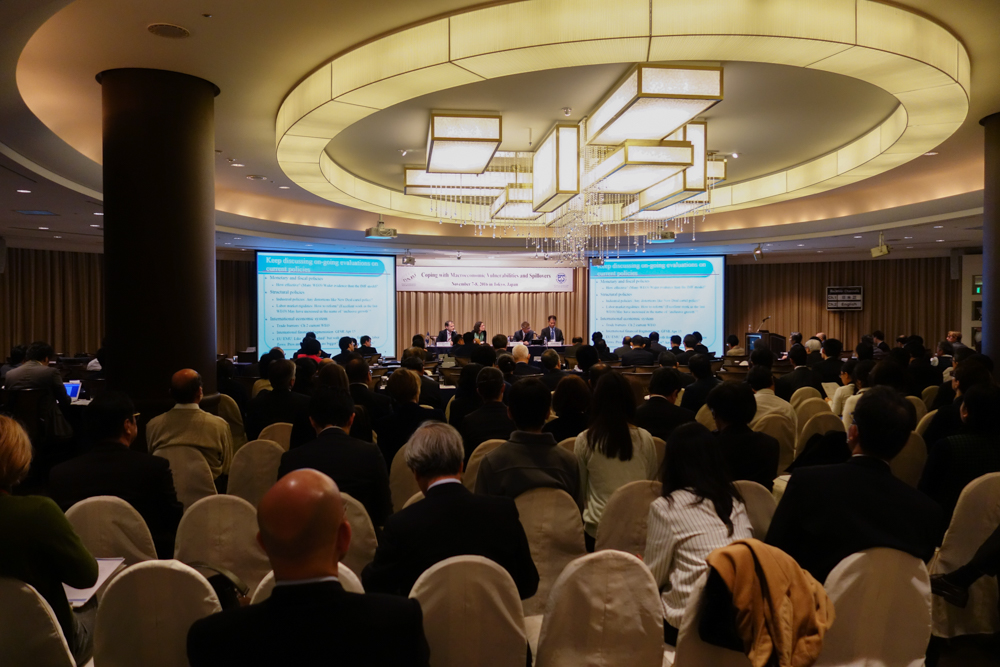Report -
Economic Seminar Series 4:
Coping with Macroeconomic Vulnerabilities and Spillovers
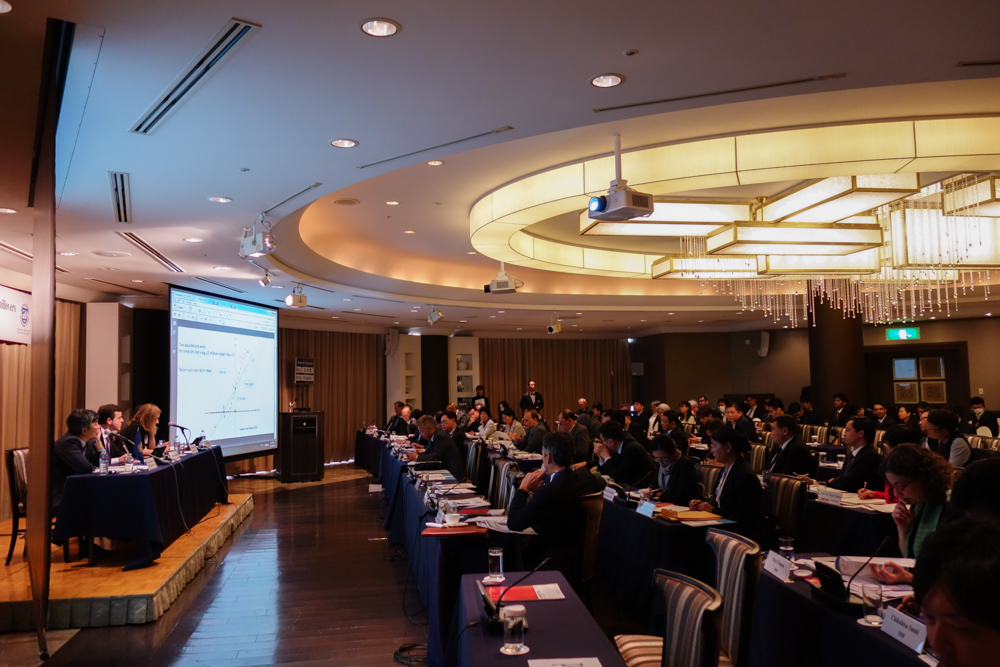
| [Date] | November 7-8, 2016 |
|---|---|
| [Venue] | “Willard” room, 5F, the Hotel InterContinental Tokyo Bay |
| [Hosted-by] | Policy Alternatives Research Institute (PARI) / International Monetary Fund (IMF) |
| [Language] | English / Japanese simultaneous interpretation |
Event Information (You can see presentation slides here.)
Report
During November 7-8, Policy Alternative Research Institute (PARI) of the University of Tokyo organized, jointly with the Office for Asia and the Pacific (OAP) of the IMF, a high-level capacity building seminar on “Coping with Macroeconomic Vulnerabilities and Spillovers”. The conference brought together senior policy makers from countries in Asia, including several Central Bank Deputy Governors, and representatives from academia, international organizations, and the private sector, to discuss the risks surrounding the global and regional economy as well as the spillover effects of such vulnerabilities for the region (the program and presentations are available at the seminar website http://www.imf.org/external/np/seminars/eng/2016/oap-utokyo2016nov/index.htm).
Session 1: The Global Outlook and Risks
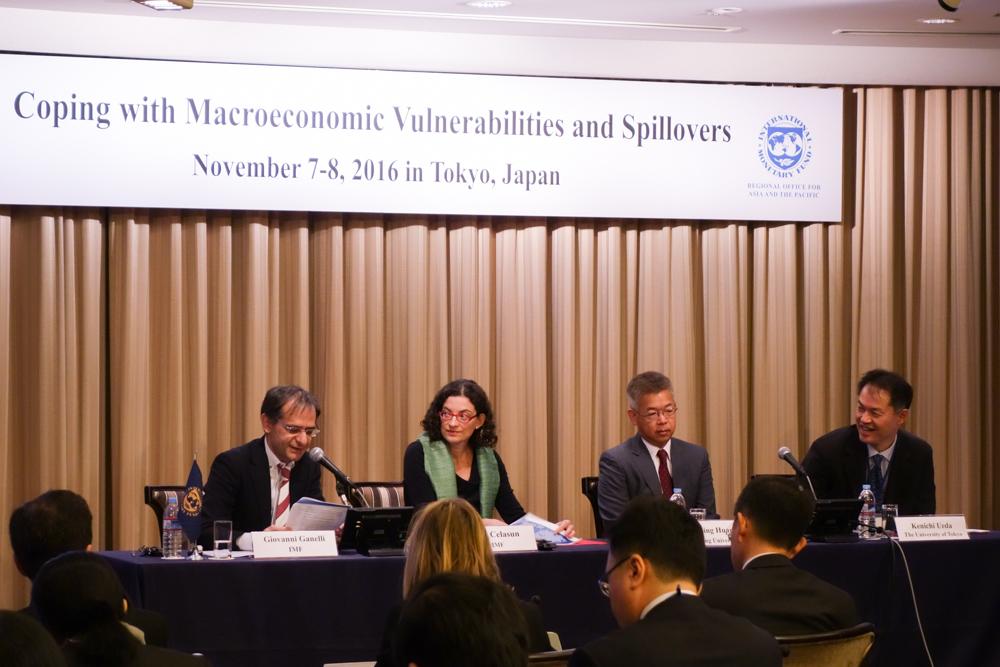
From left, Mr. Giovanni Ganelli, Ms. Oya Celasun, Dr. Yiping Huang, and Dr. Kenichi Ueda
In her presentation, Ms. Oya Celasun, Division Chief of the World Economic Studies Division of RES, highlighted that the global outlook is characterized by heterogeneity in terms of recovery from the crisis, with a dominant picture of sluggish growth and very weak global trade. Ms. Celasun stressed that, since this outlook stems from a combination of weak demand and structural issues (including demographic factors and weak productivity growth in advanced economies), policy makers should use all levers—monetary, fiscal and structural—to boost growth.
The presentation by Professor Yiping Huang from the National School of Development, Peking University, focused on China’s transition and the attendant risks. Professor Huang characterized China’s transition as a “battle” between new and old economies, with old industries loosing competitiveness and new ones (such as telecom equipment, digital finance, and robotics) growing. He stressed that the most important role for policies is supporting new industries and ensuring orderly exit of old ones, including by imposing market discipline on “zombie firms”. Professor Huang argued that, since old industries are much more leveraged than new ones, policies to facilitate the shift in the industrial structure would also reduce leverage, thus reducing the risk of China falling in what the BIS as dubbed the “risky trinity” trap of falling productivity, narrowing policy room and rising leverage.
The comments by Associate Professor Ueda, GraSPP of UTokyo, and Q&A with the floor followed. The session was chaired by Mr. Giovanni Ganelli, Deputy Head of OAP.
Keynote Address
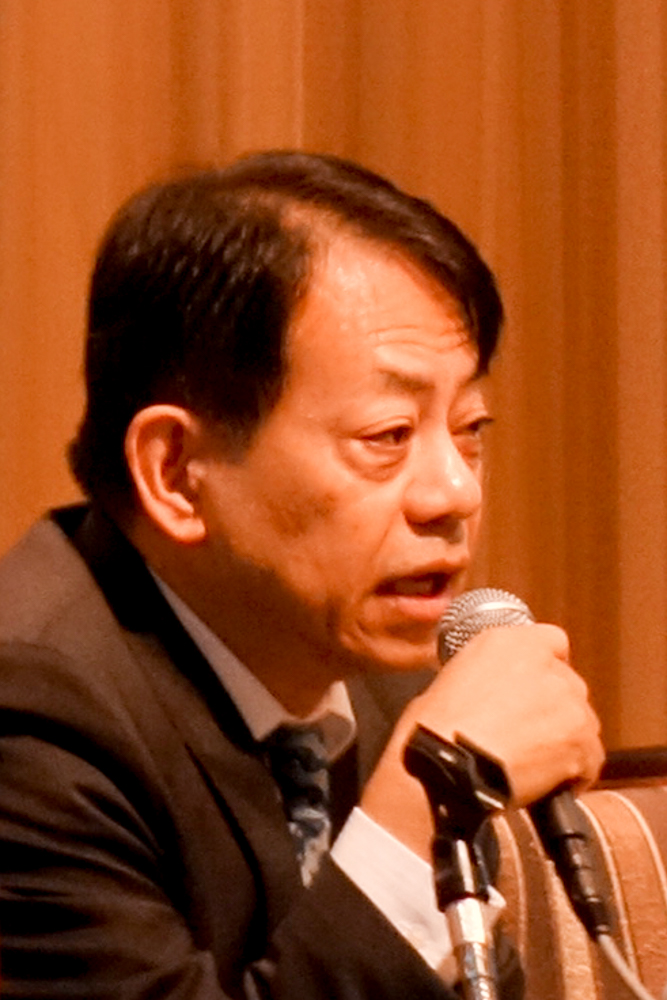
Japan's Vice Minister of Finance Masatsugu Asakawa
Japan’s Vice Minister of Finance Masatsugu Asakawa said that that the market perception of the new BoJ framework as tapering is wrong. He also quoted the IMF to argue that Abenomics has positive spillovers on the rest of the world (“stronger economic recovery in Japan would have positive spillovers for its trading partners”, from the 2016 Article IV Selected Issue Paper). His remarks at the conference were carried by market media (Bloomberg and Nikkei).
Session 2: Macroeconomic Policies of Advanced Economies and Spillovers
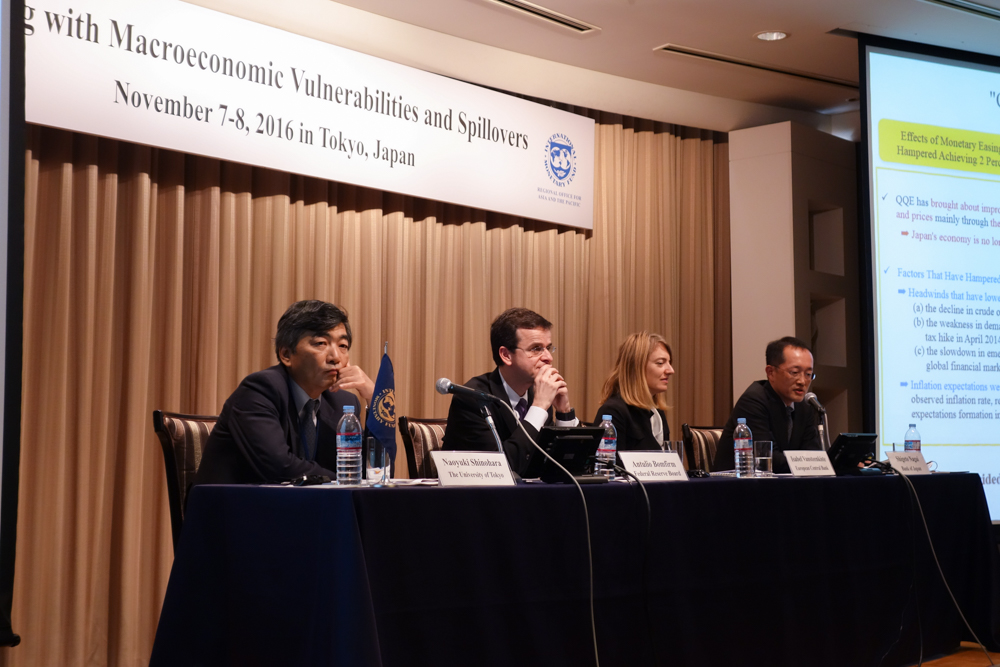
From left, Prof. Naoyuki Shinohara, Mr. Antulio Bomfim, Ms. Isabel Vansteenkiste, and Mr. Shigeto Nagai
Mr. Antulio Bomfim, Senior Adviser in the Division of Monetary Affairs of the Federal Reserve Board, stressed that the Fed made progress towards its double mandate of stable prices and maximum employment, and is now in the process of gradually removing monetary accommodation. It is envisaged that this exit process, which will be evidence based and guided by future release of data, will be centered on a gradual increase in policy rates and a gradual and predictable reduction in assets held by the Fed. The latter will not be achieved by selling assets, but rather by ceasing reinvestments after normalization of the level of the funds rate is “well under way”.
Ms. Isabel Vansteenkiste, Head of the Country Surveillance Division at the European Central Bank (ECB), focused on the challenges for monetary policy in the new global context of low growth and low natural rate of interest. She stressed that the low natural rate of interest implies that policy makers need to rely on Unconventional Monetary Policies (UMPs), and argued that the net external spillovers from the ECB’s UMP are positive, especially given that such measures have helped buttress euro area inflation expectations and hence avoided exporting a deflationary impact. She also reminded participants that monetary policy does not operate in a vacuum, and it is therefore important to use fiscal space and engage in structural reforms. The latter would not only boost potential growth, but also raise the natural rate of interest, reducing the likelihood of falling into the liquidity trap.
In his presentation. Mr. Shigeo Nagai, Director of the International Department of the Bank of Japan (BoJ), made the point that the yield curve control recently introduced by the BoJ should not be considered as retreating from monetary accommodation, especially if the overall policy package is considered. He stressed that the new framework will strengthen the joint impact of fiscal and monetary policies by reducing crowding out of private investment following fiscal expansion. Mr. Nagai also hoped that markets will pay more attention to the 2 percent inflation overshooting commitment. However, market participants at the conference were skeptical and pointed to the slowdown of JGB's purchases by the BoJ and to the fact that inflation expectations are slow to adjust.
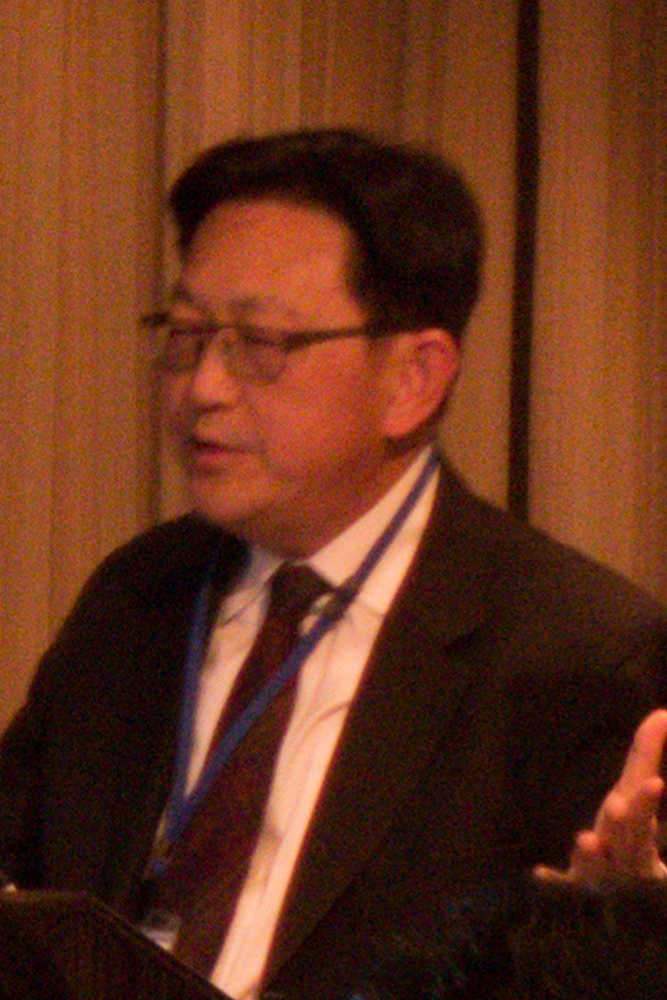
Dr. Hoe Ee Khor
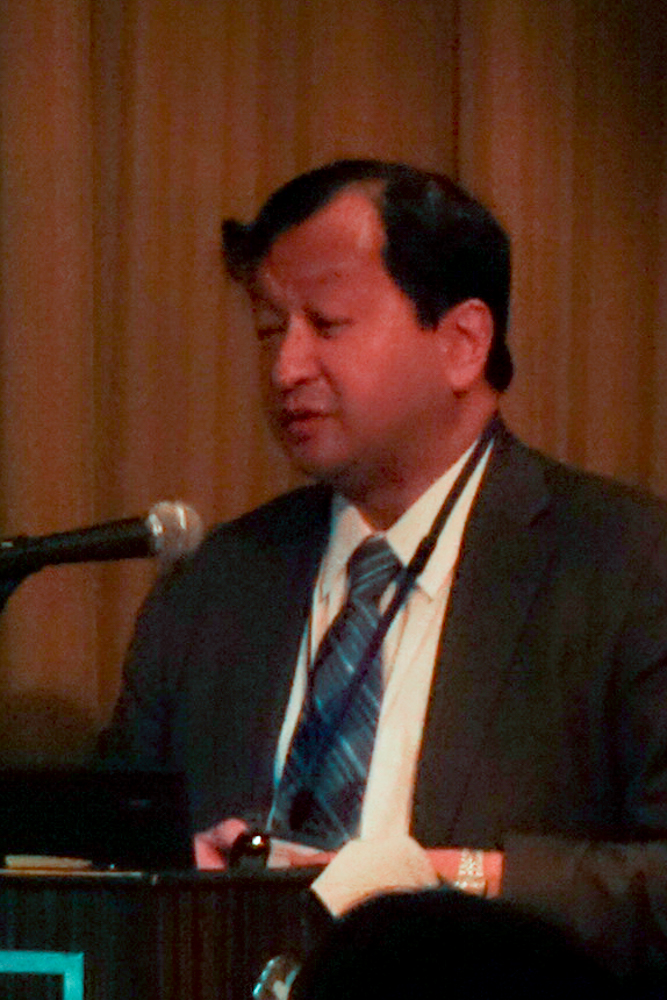
Mr. Hiroshi Ugai
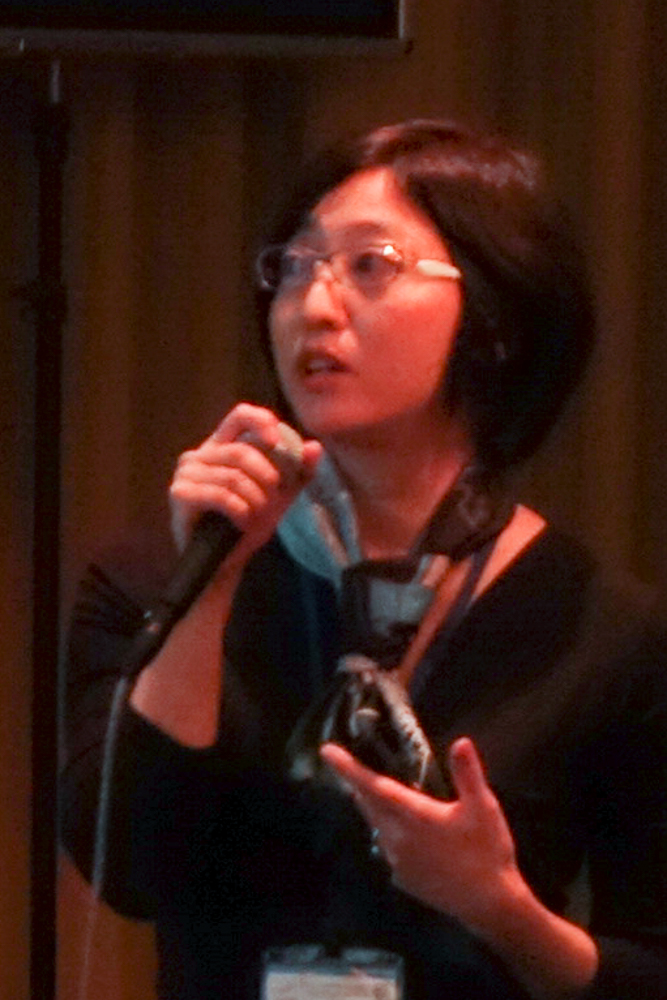
Prof. Junko Koeda
Mr. Hoe Ee Khor, Chief Economist of ASEAN+3 Macroeconomic Research Office, Mr. Hiroshi Ugai, Managing Director of JPMorgan Securities Japan and Ms. Koeda, Associate Professor of Waseda University, made comments on the presentations, followed by Q&A with the floor. The session was chaired by Professor Shinohara of UTokyo.
Session 3 : Country Experiences
(This session was for the seminar participants and restricted guests only.)
Mr. Filippo de Mauro, the National University of Singapore, made a presentation on the possible impact of a China hard landing on Emerging Asia. The comment was made by Associate Professor Rudolfs Bems, GraSPP of UTokyo. Project Professor Masahiro Kawai, GraSPP of UTokyo, and Mr. Chikahisa Sumi, Head OAP, IMF, chaired this session.
Presentations by country authorities, among others, Bank Indonesia Deputy Governor Hendar, Bangko Sentral Ng Pilipinas Deputy Governor Diwa Guinigundo and Director Hoanuk Joo of Korean Ministry of Strategic and Finance, focused on the risks and spillovers generated by external factors—such as fragile global growth and declining trade, asynchronous monetary policies in advanced economies, China’s rebalancing, and the potential impact of Brexit and other geopolitical risk—and the policy responses adopted by countries in the region. This session was chaired by Associate Professor Rudolfs Bems.
(note) The responsibility for the wording of this summary report lies with Professor Shinohara.
